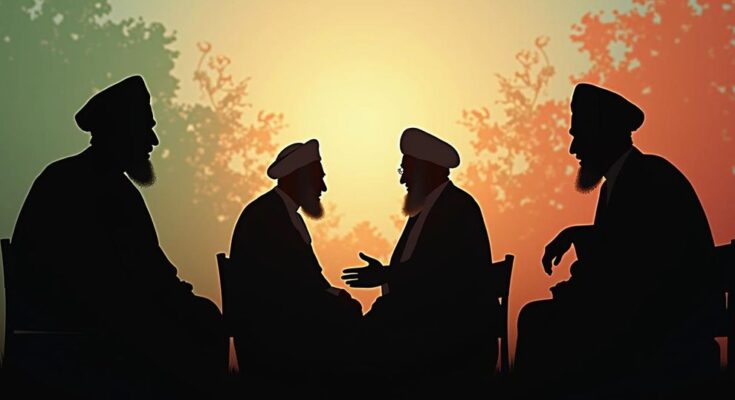Iran’s Supreme Leader, Ayatollah Ali Khamenei, expressed solidarity with Hezbollah following Israel’s claims of eliminating its leader, Hassan Nasrallah, in recent airstrikes. Iranian experts highlight the limited options available to Tehran for retaliation, as escalatory actions could lead to unwelcome consequences. With significant figures within the Islamic Revolutionary Guard Corps also confirmed dead, the future actions of Iran may pivot towards self-preservation rather than aggression, reflecting the precarious balance of power in the region. Additionally, the potential for shifts in alliances, particularly concerning Syria, remains a focal point of concern.
Iran’s Supreme Leader, Ayatollah Ali Khamenei, has reiterated the support of the country’s proxies for Hezbollah following Israel’s recent claims of eliminating the group’s leader, Hassan Nasrallah. Iranian officials confirm their limitations regarding potential retaliation, particularly in light of the casualties endured. Initial reports indicated that the Israeli Defense Forces (IDF) executed airstrikes that resulted in the death of Ahmed Muhammad Fahd, a key figure in Hamas situated in southern Syria. Subsequently, Israel announced that Nasrallah had also been killed in an airstrike in Dahiyeh, a neighborhood in southern Beirut. Hezbollah has acknowledged the loss of Nasrallah, a significant leader in the Iranian-led Axis of Resistance throughout the Middle East. Since the onset of the conflict following Hamas’s attack on Israel on October 7, 2023, Nasrallah had ordered consistent rocket strikes on northern Israel, leading to mass evacuations of Israeli citizens. Khamenei’s response to these events did not specifically mention Nasrallah but emphasized solidarity among resistance forces aligned with Hezbollah. Additional reports revealed that Brigadier General Abbas Nilforooshan of the Islamic Revolutionary Guard Corps (IRGC) was also killed in the strikes, prompting speculation about the security of Khamenei, who has reportedly been relocated to a secure venue within Iran. Hamidreza Azizi, a research fellow at the German Institute for International and Security Affairs, articulated the precariousness of Iran’s forthcoming actions, particularly as the country faces pressure to honor previous commitments to retaliate for the killing of Hamas leader Ismail Haniyeh. Azizi noted, “The equation that Iran was thinking about showing a decisive response that would prevent further Israeli activities against Iranian interests without entering into a war seems not to be available anymore after what has what has happened to Hezbollah.” The Iranian strategy, which included missile and drone strikes in response to an earlier Israeli assault on its consulate in Damascus, has not proven effective as a deterrent, leading to a dilemma for Tehran: any further action carries significant risk of escalation. Potential courses of action for Iran include entering into a war, which would provoke a fierce Israeli response, or adopting a more cautious wait-and-see approach amidst ongoing international efforts to mediate the conflicts in Gaza and Lebanon. Attempts to rally their network of partners and proxies face challenges due to a demonstrated lack of cohesion following Nasrallah’s death. Meanwhile, Avi Melamed, a former Israeli intelligence official, suggested that Iran may reconsider its posture, indicating a preference for self-preservation over escalation. He highlighted that the impact of Nasrallah’s death could reverberate in Syria, undermining President Bashar al-Assad’s hold on power and potentially prompting him to seek closer ties with other Arab nations.
The recent developments stem from a series of escalating conflicts involving Iran-aligned groups such as Hezbollah and Hamas against Israel. The airstrikes by the Israeli Defense Forces represent a significant shift in the regional balance of power and have resulted in the deaths of key leadership figures within these organizations. The historical context of Iran’s support for these groups highlights Tehran’s strategy to project its influence in the region. The internal dynamics within Iran following these incidents, including leadership decisions and strategic considerations, are crucial for understanding the implications of the current geopolitical landscape. Additionally, the lack of effective deterrence following Iranian attempts to retaliate may lead to a reassessment of their military strategies in response to Israeli actions.
The death of Hassan Nasrallah marks a pivotal shift in the Iranian-led Axis of Resistance, complicating Tehran’s regional strategy and presenting both immediate and long-term challenges. With limited options to respond effectively without risking further escalation, Iran faces a critical juncture in its approach to the ongoing conflict with Israel. The repercussions of this shifting landscape may not only affect Iranian military strategy but could also reshape alliances, particularly in Syria, as regional actors reassess their positions amid the changing dynamics.
Original Source: www.newsweek.com




